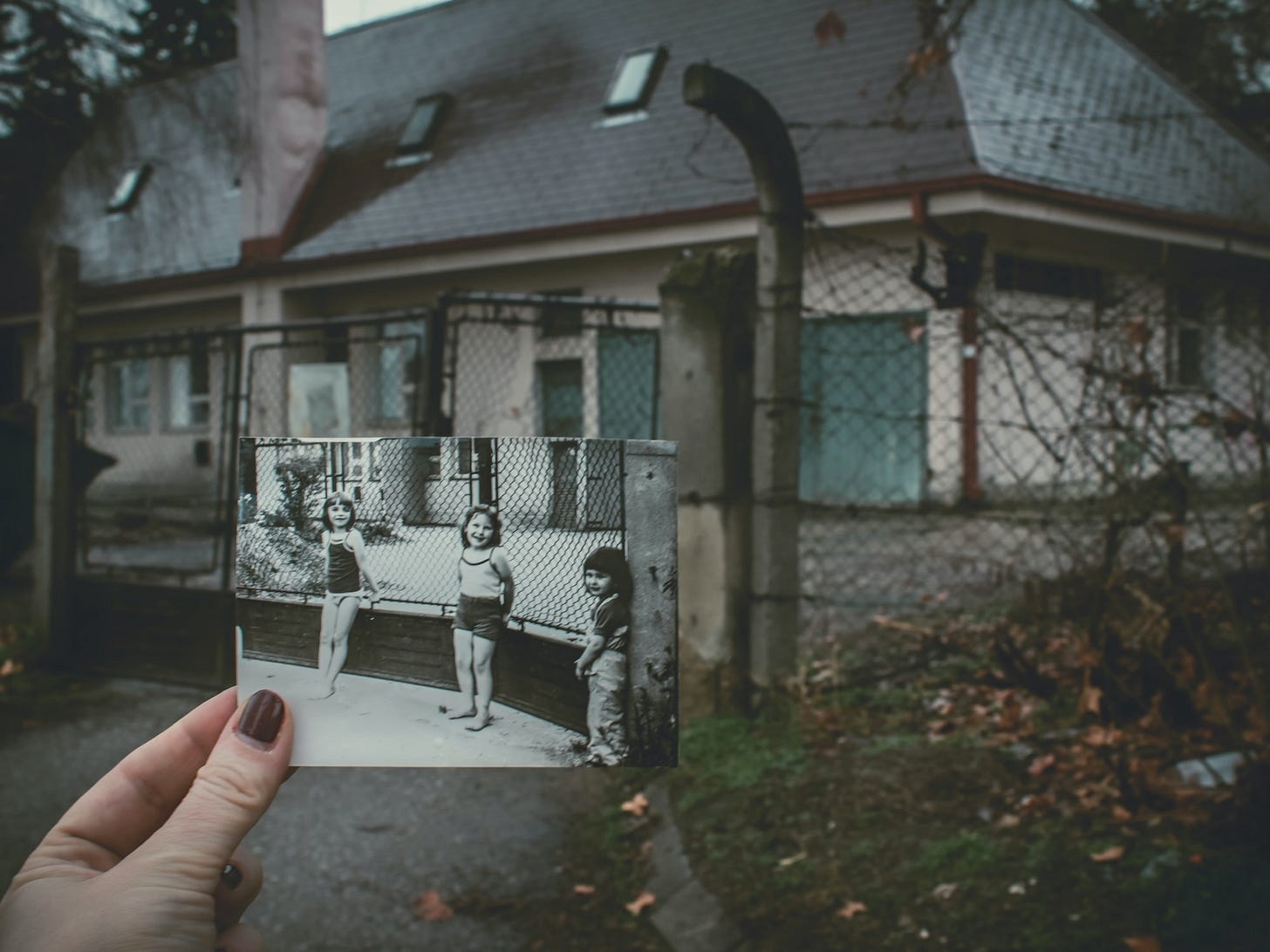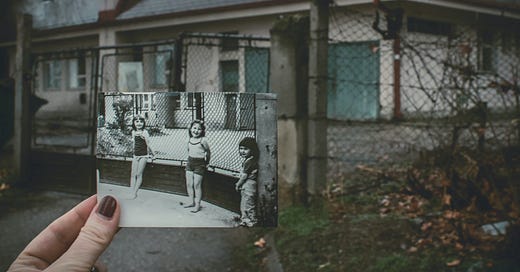Memory Memorialized
The antidote against Memory Treachery

“What you end up remembering isn't always the same as what you have witnessed.”
- Tony Webster, The Sense of An Ending (by Julian Barnes)
Our memory is unreliable, fluid, and changeable. It can trick and deceive us. This is the main idea Barnes explores in his Booker Prize winning novel and a reality I’m slowly coming to grips with. I always thought my memory was infallible, but I’m beginning to realize that not only is my memory like a sieve, I am also susceptible to making “sly cuts” and adjustments to my life story.
We are prone to forgetting things and, at a deeper level, we also fall prey to embellishing our memories.
Forgetting
We are all familiar with the first layer. You often hear people say:
“I’m not good with names.”
“Please remind me.”
“Sorry, it slipped my memory.”
There are countless examples where memory fails us. Sometimes it can be quite funny. The other night, Jess and her dad made a bet about the order of the dogs her family had during her childhood. Jess was convinced Pepsi came before Baby. Before I take a wicked tangent on the pet naming conventions of her family, let’s just say she now owes him dinner.
Other times it’s less amusing. Like when I forget to buy the green beans from our local fruit and veg stand on the way home from work. Face palm, can we use frozen veggies instead? While this is still harmless, memory treachery can be more of a liability, especially when it comes to forgetting important things like birthdays, anniversaries and colleagues’ names.
With so much information to consume, it’s no wonder we can’t store everything on our tiny hard drives. To help us, our brains create shortcuts to remember the highlights. We remember experiences in our lives as a sequence of snapshots instead of a complete catalogue of events. Daniel Kahneman (Thinking Fast and Slow) calls this peak-end cognitive bias1:
“intense positive or negative moments (the “peaks”) and the final moments of an experience (the “end”) are heavily weighted in our mental calculus.”

A few months after going on holiday, you are unlikely to remember every nitty gritty detail, but you will definitely remember when your drone got stolen (peak negative emotion) or the best restaurant you visited (highlight). Our minds average out the moments that stand out and do some mental math to form an opinion about the past. This could also explain why people sign up for another Ironman race after just completing the gruelling event. The endorphin-laden high at the end overrides the pain of the race.
While this shortcut helps us form impressions about past events, it doesn’t prevent us from forgetting things and it doesn't help us make the most of our memory catalogues. Not only the peaks and ends, but everything in between.
The antidote to the first level of memory treachery is to document everything. Take notes, capture your conversations, journal, write down names (super hack!) and do what it takes to plug the gaps in your memory sieve.
From Alex Lieberman (Morning Brew) on documenting:
One big lesson I've learned in life is that our memories are imperfect and that's why documenting everything, everything in life, professionally or personally, is such a huge asset.
And David Perell (Write of Passage) on Kendrick Lamar’s note-taking system:
A fresh insight is a fragile thing, so Kendrick is a prolific note-taker. Ideas are perishable. His pen preserves what his memory forgets. When an idea isn’t saved, it starts to decay.
It is useful to remember more than only the snapshots. By memorializing your memory, you can capture your ideas, make better impressions on people, write from conversation, perform better at your job and you might even remember the green beans.
Embellishing
The second layer of memory treachery is less obvious, but far more dangerous.
This is what Tony falls prey to in The Sense of An Ending. He remembers his life in a way that makes him look like a better person than he actually is. He constructs a narrative to make him feel better about himself, but upon reflection he realises that he hurt people during his life, including himself. As Barnes writes:
“How often do we tell our own life story? How often do we adjust, embellish, make sly cuts? And the longer life goes on, the fewer are those around to challenge our account, to remind us that our life is not our life, merely the story we have told about our life. Told to others, but—mainly—to ourselves.”
This serves as a constant reminder to remember my past honestly without beautifying my role in it. While I was more susceptile to memory embellishment when I was younger (at school, I even found ways to blame my dad for how I got bowled out in cricket matches), I am still prone to saying things like: “I didn’t perform well because the conditions didn’t suit me” or “My manager held me back and the work environment was toxic.”
There is a lot of pain between these constructed memories and reality. It’s a missed opportunity to learn. Instead of deceiving myself, I could be more honest and remember things more accurately: “I didn’t prepare well enough for the race and I can train more next time” and “I was not passionate about the job. It’s nobody else’s fault.”
There is something stoic about that. Be more honest with the person in the mirror. Be true to the memory of your life and don’t drift too far from reality like Tony did. View bad experiences as a gift, as difficult as that sounds. Instead of saying “this happened to me and it was dreadful”, reframe it as “through this tough experience I learned something about myself.”
The best ways to have more honest memories are to document your past (as above) and to ask for feedback. To prevent the pain he caused, Tony could have asked his friends and ex-girlfriend how they remembered the critical experiences from the past and how his actions made them feel.
Through notes and conversations, you can turn your memory from an unreliable partner into an enabling ally. You can use your past to navigate your future. By documenting as much as possible and staying close to the truth, you can defeat memory treachery and you may end up remembering what you have witnessed.
Thanks to Jess Schanz, Nic Rosslee and Trisha Reddy for reading drafts of this essay.
Notes:
From “The Peak–End Rule: How Impressions Become Memories” by Lexie Kane for the Nielsen Norman Group: https://www.nngroup.com/articles/peak-end-rule/.




